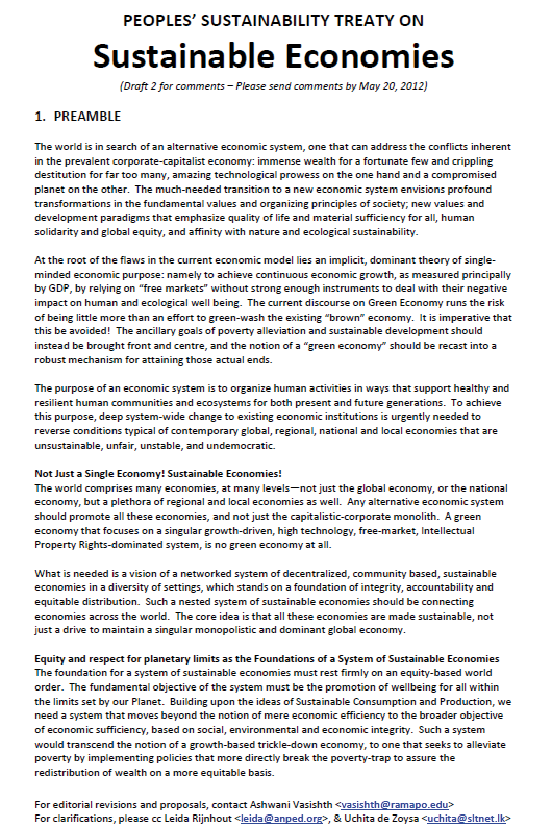Dear Aubrey
By all means, do count me as a supporter, Aubrey.
Ashwani Vasishth, PhD,
Center for Sustainability, Ramapo College of New Jersey
PEOPLES’ SUSTAINABILITY TREATY ON SUSTAINABLE ECONOMIES
For editorial revisions and proposals, contact Ashwani Vasishth <vasishth@ramapo.edu>
Changing How We Measure and Manage the World’s Diverse Economies
The time has come to transcend growth-based metrics such as the Gross Domestic Product (GDP), and move toward a more sophisticated set of indicators that more realistically take account of genuine progress towards human wellbeing and restoration of natural capital. This will allow us to transition to a planetary system of resource and wealth management, one that better nurtures the global commons. What we need is a system of economic control that is sophisticated enough to allow the implementation of ideas such as Contraction and Convergence—in which nations across the board commit themselves to addressing and dismantling the acutely increasing levels of disparity and deprivation, while the richer nations contract their consumption in a manner that allows all nations to converge toward a more equitable future state of development. At the same time, we need to move toward a system of economics that takes better account of externalities, such that the prices of goods and services begin to accurately reflect their actual and true costs to society.
We urge that Governments make clear commitments to: -
- Keep Equity front and centre in economic decision-making.
- Move beyond GDP to a more holistic suite of indicators.
- Retract all fossil fuel subsidies and other subsidies that harm the environment, distort markets and create barriers to sustainable development. Where needed, and particularly in developing countries, safeguards must be established to protect vulnerable sectors of society. And as harmful subsidies are reformed, support should be focused on transitioning to clean, renewable energy technologies, as well as green industries and technologies, especially those in their infancy.
- Take serious global action to promote sustainable consumption and production.
- Set up systems for decentralised planning of sustainable infrastructure.
- Focus on Green Jobs and Decent Work, while phasing out “brown” jobs.
- Give priority to Small and Medium-sized Enterprises in national planning.
- Establish a global framework for corporate accountability.
- Establish a Planetary Global Commons Management System that regulates the use of natural
resources, waste and wealth.- Implement the Contraction and Convergence model of growth, in which all countries shift their ecological footprint to sustainable levels. This implies that the richer countries shrink their ecological footprint, while developing nations stabilize theirs on a per capita basis, until all countries converge to an equitable footprint that is suitable for One Planet Living.
Action #3: Toward Contraction & Convergence
Convene a set of round-tables or working groups to understand and explain the applications of the Contraction and Convergence model proposed originally by the Global Commons Institute, and explore the implications of this model for an equitable and sustainable set of economies.Action #3: Implementing A Contraction & Convergence Model
Support the implementation of this model at the global level, and track its deployment across Regions and over time.
- Uchita de Zoysa, Centre for Environment and Development (CED), Sri Lanka
- Ashwani Vasishth, Center for Sustainability, Ramapo College of New Jersey, USA
- Leida Rijnhout, Northern Alliance for Sustainability (ANPED), Belgium
- Kim Carstensen, Fair Green Solutions, Denmark
- Tara Rao, Fair Green Solutions, India


